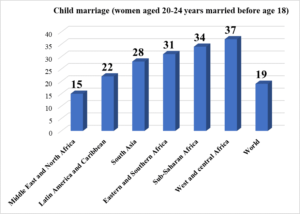To end GBV & Child Marriage, our commitment to addressing the issues should not remain at a “project” level and be ad-hoc in nature nor policies undertaken in isolation from one another.
Are you a step-dad, uncle, pastor, Imam, opinion leader, teacher or cousin, never take advantage of people who need your help. It’s never right! Let’s do the right thing. Stop child marriage Now!
The detrimental old-fashioned practice of child marriage continues worldwide. In developing countries, more than 30 percent of girls are married before the age of 18, and 14 percent before they are 15. Defined as a customary, religious or legal marriage of anyone under 18, child marriage occurs before the girl is physically and psychologically ready for the responsibilities of marriage and childbearing. It therefore has major consequences for public health, national security, social development, human rights, economic development and gender equality. This is the main reason why we all need to be aware of the issues and contribute to stopping child marriage now.
Continuing from last week’s issue, child marriage in Ghana is illegal as the 1992 constitution and the 1998 Children’s Act set the legal age for marriage at 18 for both girls and boys in Ghana. The domestic legal framework on child marriage has been promoted and informed by Ghana’s ratification of relevant international instruments to include also the African charter on the Rights and Welfare of the Child among others.
We can as well cite the Child and Family Welfare Policy and the Justice for Children Policy. The National Gender Policy, which was approved by Cabinet in 2015, also prohibits Child Marriage. All these existing policies seeks to implement a child protection system that will be fit for Ghana and support effectively prevent first then protect children from all forms of abuse and as well strengthen family and community engagement in child protection. The policies are sure to address issues pertaining to ending child marriage in Ghana.
Other policies we can take a look at includes; the Adolescent Reproductive Health Policy (2000), which encourages the development and implementation of activities and services to enhance and expand options available to adolescents in the area of reproductive health. Finally, the National Youth Policy (2010) provides a framework for the Government to engage the youth and other stakeholders in meaningful partnership to develop appropriate interventions and services for youth empowerment and development.
At the just ended CSO networks capacity building workshop on advocacy to end gender based violence and child marriage situation in Ghana and in the sub-regions, Madam Sarah Adwoa Safo, the Minister of Gender, Children and Social Protection, in an address read on her behalf during the opening ceremony of the three days international hybrid conference organized by ProHumane Afrique International and the dRPC – Nigeria with the Ford Foundation sponsoring the initiative; the minister said Gender-based violence was a violation of fundamental human rights that denied the victim’s human dignity and hampered national development.
According to the minister, “the unequal power relations among men and women were one of the root causes of gender-based violence faced by the country and the continent as a whole”. The Minister said her ministry had developed several policies, laws, and strategies to protect women and girls to enable them to fully contribute their quota to national development.
Now different from the earlier laws and policies I made mention of, here comes a host of many other; “Among these frameworks were a five-year Strategic Plan to address Adolescent Pregnancy in Ghana, a National Gender Policy and its Strategic Implementation Plan, National framework on ending Child Marriage and National Domestic Violence Policy and Plan of Action to implement the Domestic Violence Act, 2007 (Act 732).
Madam Sarah Adjoa Safo again said her ministry had made interventions as part of efforts to adequately address gender-based violence and child marriage, through engagement with men and boys as advocates for gender equality, and the elimination of harmful cultural practices to aid the rescue of the girl child from early marriage.

Am sure you will agree with me when I say, for Ghana our issue is not the non-availability of laws but lack of enforcement. I am of the opinion that, while many of these initiatives in Ghana reflect a genuine commitment to address child marriage, many of them have remained at a “project” level and are largely short term and ad-hoc in nature and are usually undertaken in isolation from one another. This I believe has limited the capacity for long-term sustainable impact on the subject matter.
According to the global 2021 database report released by UNICEF, West and Central Africa recorded highest figures of 37% as against Middle East and North Africa were the date showed 15%, South Asia recorded 28% for women aged between 20 to 24 years now who were married as child brides before they were aged 18 years old constituting child marriage. This means that, approximately 4 in 10 women were married before they attained the age of 18.

The same global 2021 database report released by UNICEF also alerted that, looking at the percentages of girls married and or in union before age 18 in Ghana over the period from 2006 to 2018 33.6% was recorded for the year 2006. The figure increased from 33.6% to 36.4% by 2011 and declined again to 34.1% by 2018. This implies that, in Ghana one (1) out of three (3) girls married before age 18. This represents a 34.1% margin nationally.
If the earlier chart showing West and Central Africa a high percentage of 37% and nationally for Ghana, at 34.1% then the proportion of child marriage in Ghana and sub-Saharan Africa are therefore said to be similar within the 34- 37% bracket.
According to snapshots of key finding from the Multiple Indicator Cluster Survey (MICS) from 2006 to 2018, conducted by Ghana Statistical Service in collaboration with the Ministry of Health, Ministry of Education, Ministry of Sanitation and Water Resources, Ministry of Gender, Children and Social Protection, Ghana Health Service and the Ghana Education Service as part of the Global MICS Programme; the key finding points to the fact.

The percentage of girls in union before age 18 by residential segregation from 2016 to 2018 has it that; Child marriage remained insistently high in rural areas between 2006 to 2018; than recorded for the urban certain. The report found out that, girls with little or no education were usually more likely to get married before age 18 than those with secondary or higher education. The same way, the situation was said to be highest again among the poorest households, and lowest among the richest households. The three northern regions then were denoted with the highest incidence that is Northern, Upper West and East regions of Ghana.
Interestingly enough, the 2014 Ghana Demographic and Health Survey which was implemented by the Ghana Statistical Services revealed that 14% of girls aged 15-19 years had begun childbearing in Ghana. We have been able to access so far that lack of education and poverty are key drivers as well as teenage pregnancy and enforcement of the law which we already discussed in our earlier version as causes of child marriage. It is absurd to believe that giving our girls in early marriage as brides will protect them from gender based violence. This is also another cause as well as harmful social norms. Please allow our girls to go to school as girls and not forced in early marriages as brides.
How can a child take care of another child when given in an early child marriage and seen to be given birth? Child mothers and their children are more vulnerable to infections and deaths than adult mothers and their children. Looking at the West Africa situations, to curb the menace, I propose among other things that; we empower girls and boys to be better able to prevent child marriage, influence positive change in our communities’ beliefs and attitudes and social norms that drive child marriage, fast-track access of adolescents, particularly girls, to quality education, reproductive health services and other opportunities, enable the implementation and enforcement of existing national laws, policies and strategic frameworks related to ending child marriage, increase data and evidence available to inform policy and programming and also ensure effective harmonization of the various initiatives to end child marriage which is very important.
We can change the narrative on Gender Based Violence. Let’s do that by working together to eradicate violence against women and girls around the world. Become an ambassador your own by knowing the facts and educating your peers. I use this opportunity to call upon all people of goodwill, social clubs, associations, churches and institutions to support the advocacy to ending gender based violence and child marriage in Ghana and in the sub-region now.
Civil societies and other bodies are doing a lot; institutions should support their efforts and channel your corporate social responsibility giving’s to creating more awareness and promoting advocacy on GBV and support to ending child marriage situations in Ghana and in the sub regions now.
By Baptista S. H . GEBU
Baptista is a Hybrid Professional and the Executive Director of ProHumane Afrique International. ProHumane is a charitable, development & think thank organization working with communities & individuals to create sustainable solutions to transform communities through diverse pro-poor initiatives.
Pro-poor initiatives are initiatives that help to alleviate poverty. Baptista is a realist, affable, simple and humane. You can reach her via e-mail on [email protected] and follow this conversation on all our social media sites: Linked-In/ Twitter/ Facebook/ Instagram: ProHumane Afrique International. Call or WhatsApp: +233(0)262213313. Hashtag: #behumane #thegivingcapsules #prohumaneafriqueint #fowc










